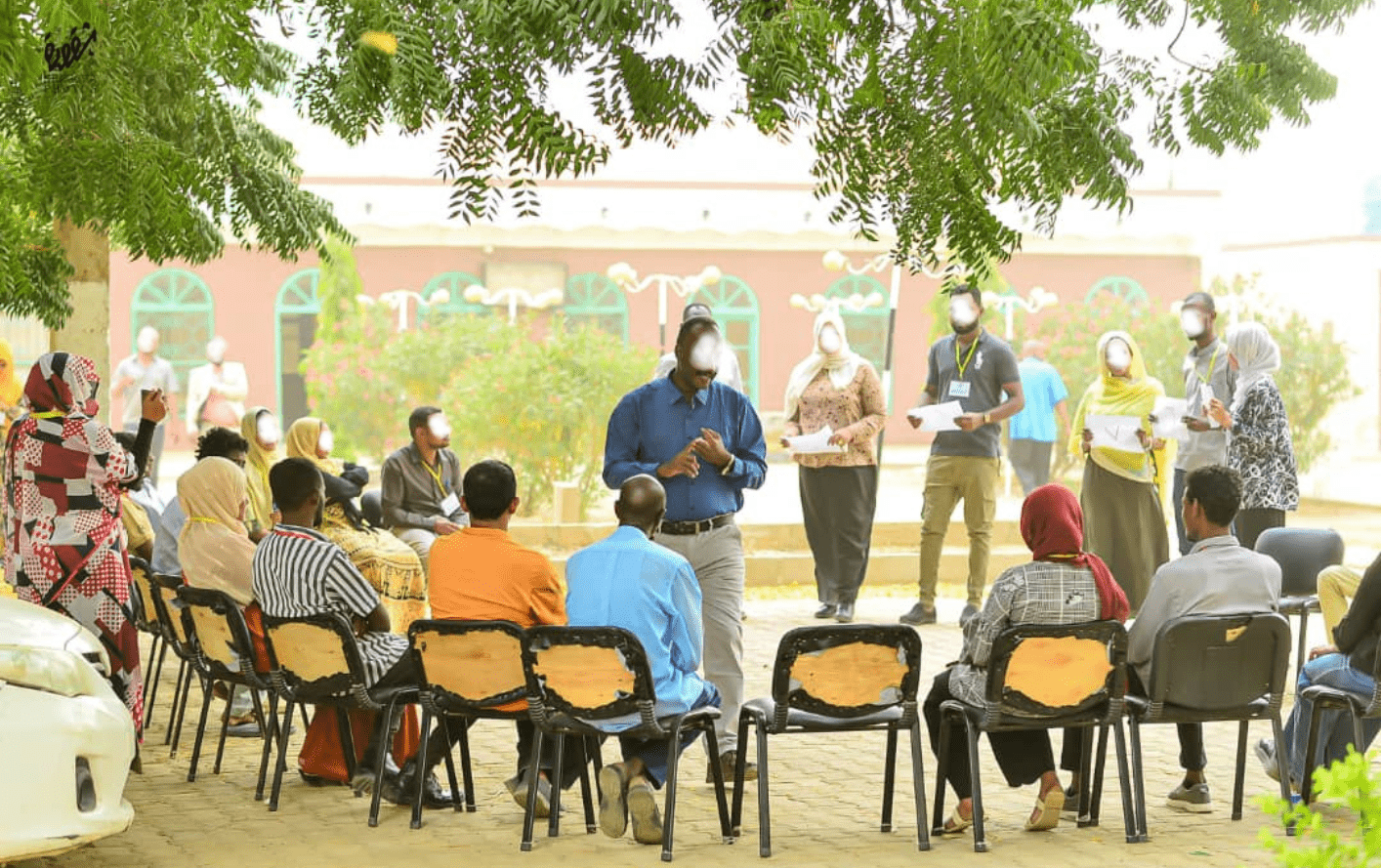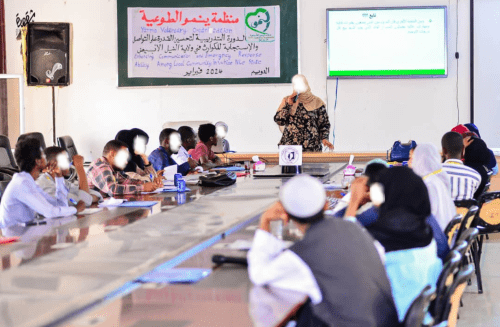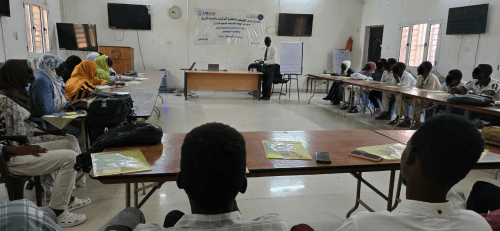
Since the outbreak of the war in Sudan, Resistance Committees (RCs), known for their political and civic activism, have transformed into Emergency Response Rooms (ERRs). These ERRs have become essential in supporting local communities amid the ongoing conflict. Their initial efforts focused on information sharing and facilitating the evacuation of civilians, including staff from international NGOs to safer locations like hotels and schools, as well as assisting at the Halfa crossing into Egypt. Over time, given the food shortage and growing famine in parts of Sudan, their primary mission evolved into delivering humanitarian aid where access to international organizations was restricted, beginning with food distribution through community kitchens.
Amidst immense suffering and displacement, ERRs have emerged as critical lifelines for those in crisis. These grassroots initiatives, driven by local volunteers, provide essential services to affected populations, embodying resilience and hope in the face of adversity. Operating throughout Sudan, particularly in conflict-affected regions such as Khartoum, Darfur, Blue Nile, Kordofan, and East Sudan, ERRs play vital roles in humanitarian assistance and civic action. For example, in Babanusa, West Kordofan, ERRs prepared shelter camps and provided food for those displaced from nearby cities. Facing significant safety concerns and threats to their lives, their unwavering commitment reflects the core mission of the ERRs: to alleviate suffering and restore dignity to those enduring the harsh realities of conflict. Their impactful work has garnered international recognition, with ERRs nominated for the Nobel Peace Prize in 2024. This acknowledgment highlights their indispensable role in delivering lifesaving aid and fostering hope amidst one of the world's most severe humanitarian crises.
ERRs serve as beacons of hope in a tumultuous landscape, providing not only immediate relief but also a sense of community and belonging. They facilitate essential services crucial for survival, from distributing food, water and medicine to creating temporary shelters, evacuation assistance, child-friendly spaces, reconnecting electricity, and community support through supporting social cohesion and peace. Long queues form as people line up for aid, emphasizing the importance of every meal as a lifeline for the most vulnerable populations. Their grassroots representation is vital; ERRs are deeply rooted in local communities, providing a direct channel for understanding and addressing the needs of those most affected by conflict. This local knowledge enables ERRs to tailor their responses effectively, ensuring that aid reaches those who need it most. Beyond their humanitarian roles, ERRs play a critical part in fostering trust and social cohesion within communities. By creating platforms for collaboration, they encourage dialogue among diverse groups, promoting a more peaceful, united, and inclusive society. One ERR representative reflected that “there was admiration for the democratic way the (ERR) youth organize their work.” This highlights how ERRs can empower other civil society organizations, exemplifying grassroots activism in action. By strengthening their capacity, local organizations can respond to crises.
ERRs actively engage communities, especially women and youth, in peacebuilding initiatives. Programs like USAID/OTI’s Khatawat Sudan implemented by DT Global facilitate discussions that bring together displaced individuals and host communities, fostering dialogue and collaboration. This engagement empowers community members to voice their needs for peace and actively participate in shaping their future. As one ERR coordinator based in Kampala, noted, “The host and IDPs work together to support the most affected people, bringing a sense of unity and cultural exchange that may lead to a positive social impact.” Such cooperation not only addresses immediate needs but also tells a powerful story of social change and cohesion. The story of ERRs in Sudan is a powerful narrative of hope, resilience, and the transformative potential of community-driven initiatives. By providing essential services, fostering social cohesion, and advocating for peace, ERRs are alleviating the suffering of displaced populations and contributing to the long-term stability and development of Sudan.

ERR members attend a communication training course
Supporting ERRs is not just an act of charity; it's a strategic investment in peace. Adopting a unique approach, the USAID/OTI program plays a crucial role in this support, empowering ERRs in the East, Greater Kordofan and Blue Nile, to become more sustainable and effective in their work. By enhancing their organizational capacity, USAID/OTI ensures these grassroots initiatives are not just surviving but thriving. As another ERR member stated, “Training and preparing the youth contributed to the program's acceptance. The organization was asked to train local administrations to support the youth.” USAID/OTI’s targeted assistance provides essential training, resources, and networking opportunities, enhancing ERRs’ communication skills, coordination capabilities, and organizational structures. Other ERR representatives have noted, “We benefited immensely from the activities, specifically in the form of institutional support built on capacity building and asset donation like IT equipment.” This targeted approach has empowered ERRs to become more resilient and effective, allowing them to deliver services efficiently and reach a wider range of communities in need.
This partnership amplifies the voices of local volunteers, enabling them to transform their communities through compassion and collaboration. Another ERR member said that workshops "opened my eyes to the importance of engaging with our community and understanding their needs. I now feel more prepared to lead our efforts in making a real difference jointly with the other ERR members." By investing in ERRs, USAID/OTI is not only addressing immediate humanitarian needs but also laying the groundwork for a more peaceful future in Sudan. Together, they illuminate the path forward, proving that even in the darkest times, hope can flourish through community action and resilience.

ERR members in a collaboration and context analysis workshop
The Emergency Response Rooms in Sudan stand as a testament to the power of community-driven initiatives. Their unwavering commitment to providing aid, fostering social cohesion, and advocating for peace has profoundly impacted countless lives. However, their activism means that they also face challenges. As the conflict in Sudan continues, the support provided by donors like USAID/OTI remains essential in ensuring the sustainability and effectiveness of these invaluable grassroots organizations. Meanwhile, ERRs continue to advocate for peace and the potential of ERRs to contribute to Sudan's peace processes remains significant.